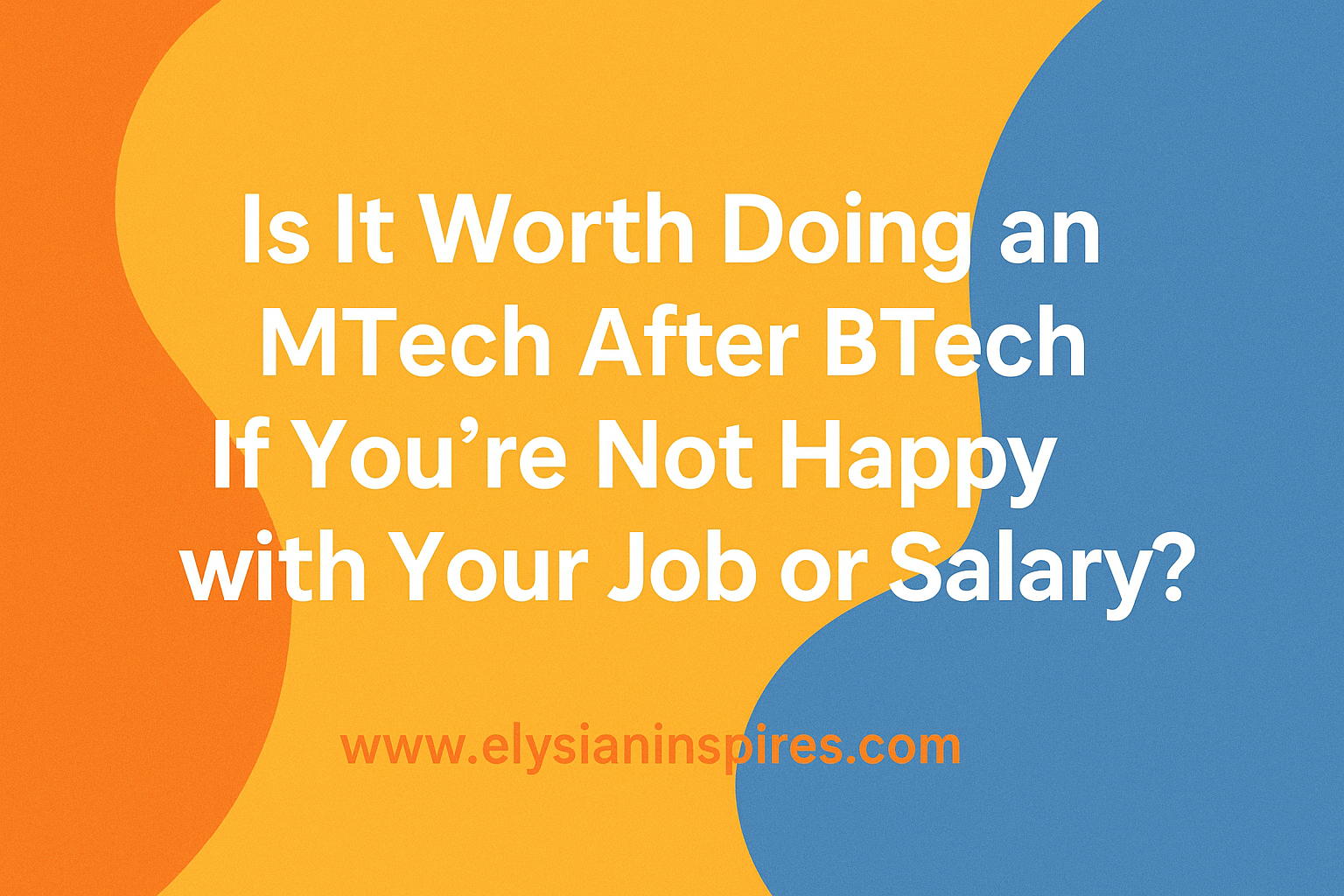Is It Worth Doing an MTech After BTech If You’re Not Happy with Your Job or Salary?
Is It Worth Doing an MTech After BTech If You’re Not Happy with Your Job or Salary?
Feeling stuck in an entry level engineering role? An MTech is worth pursuing only if it directly aligns with the career growth, research ambitions, or domain expertise you truly want to build; otherwise, investing two more years and several lakhs may not fix job dissatisfaction or salary woes. Reliable career guidance can help you weigh the trade offs before you commit.
Why am I unhappy with my current BTech job or pay?
Most graduates cite one (or more) of these issues:
- Job role feels repetitive and lacks learning opportunities.
- Pay has plateaued despite extra effort.
- Skills no longer feel relevant in a fast changing tech market.
- Mismatch between personal strengths and assigned projects.
If those pain points ring true, you’re not alone NASSCOM’s 2024 survey showed that 58 % of fresh Indian engineers look to upskill within the first three years.
Will an MTech really boost my salary?
Short answer: sometimes. Industry data gathered by PayScale (2025) indicates the following median salary bump for core engineering roles in India:
| Qualification | 0–3 yrs exp | 4–7 yrs exp |
|---|---|---|
| BTech only | ₹4.8 LPA | ₹7.2 LPA |
| MTech (relevant) | ₹6.5 LPA | ₹10.1 LPA |
That looks compelling, but notice the keyword relevant. An MTech in VLSI helps very little if you plan to pivot into data science. Without clear alignment, recruiters often value demonstrable project work or certifications more than an additional degree.
What questions should I ask before applying for MTech?
1. Do I want deep technical expertise or broader business skills?
If you love R&D, lab work, and publications, an MTech followed by a PhD can be ideal. If you’d rather move toward product management or consulting, an MBA or targeted micro-credentials might pay off faster.
2. Can I afford the opportunity cost?
Two years out of the workforce means forfeiting potential earnings of ₹8–12 L. Factor that in along with tuition fees.
3. Will the specialisation stay relevant in 5–10 years?
Talk to mentors and review industry trend reports. A strong academic program in AI, Cyber-Physical Systems, or Renewable Energy typically holds value longer than legacy speacialisation.
4. What do employers in my desired field actually prefer?
Scan LinkedIn job listings and alumni profiles. Many top semiconductor firms in India explicitly list MTech as a plus; most software product companies do not.
Alternatives to a full time MTech
- Executive or part-time MTech: Evening or weekend formats let you earn and learn. IIT-M’s Work Integrated program is a popular example.
- Specialist certificates: Coursera, Up Grade, and ISC2 can add sought-after skills (cloud, cybersecurity) within months.
- Lateral moves: Sometimes a switch to a growing startup or domain can unlock better pay without another degree.
- International MS with scholarship: Higher ROI if you aim for global roles but be mindful of visa constraints.
Pros and cons at a glance
| Aspect | Full-Time MTech | Upskilling Certifications |
|---|---|---|
| Depth of knowledge | High | Moderate |
| Time investment | 2 years | 3–9 months |
| Opportunity cost | High | Low |
| Research exposure | Excellent | Limited |
| Employer perception | Strong in core engineering | Mixed but improving |
Real world example
Arun, a 2019 BTech Mechanical graduate from Chennai, faced stagnant pay (₹5 LPA). After a career guidance session with Elysian Inspires, he discovered a passion for computational fluid dynamics. He enrolled in an IISc-affiliated MTech (sponsored by his employer) and now works as an Aerodynamics Analyst at ₹12 LPA. Contrast that with Priya, who opted for a six-month data analytics certificate and transitioned to a fintech firm at ₹11 LPA within a year no second degree required.
How to decide an action checklist
- Clarify long-term goals (research, leadership, entrepreneurship).
- Map required competencies against current skill gaps.
- Calculate true cost (tuition + lost income).
- Interview seniors or LinkedIn connections who pursued the same path.
- Book a career guidance session to interpret psychometric and Multiple Intelligence assessments.
Where does Elysian Inspires fit in?
Our counsellors combine scientific assessments with market data to help you:
- Discover strengths and growth areas.
- Match them to viable higher-study or upskilling routes.
- Build a profile (CV, SOP, interview prep) that stands out.
- Manage exam stress and application timelines.
Book a slot for personalised career guidance at our Chennai centre or online: Career Counselling in Chennai.

